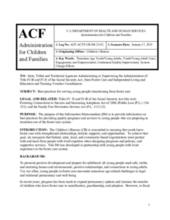Displaying 31 - 40 of 2509
A randomized controlled trial examined the effectiveness of a peer grief support program for youth in foster care, an underrepresented population who experience disenfranchised grief.
This consensus statement on youth in foster care makes a case for a developmentally informed system of care. Although it avoids making specific policy and practice recommendations, it identifies general areas where research can inform change.
This study investigates how Kinship Navigator Programs (KNPs) help mitigate disparities in caregiving challenges faced by informal kinship caregivers (especially grandparents) of maltreated children. Using Latent Class Analysis, the research identifies three distinct patterns of caregiving challenges: financial, child's behavioral/emotional health, and intergenerational family dynamics.
The Adoptions and Safe Families Act (ASFA) of 1997, combined with rising incarceration rates, has increased the risk of parental rights termination for incarcerated parents, often leading to foster care placements for their children. A review of state-level policies found most lacked coordination between the child welfare and criminal legal systems, highlighting the need for cross-system collaboration and inclusion of parents with lived experience in legislative efforts.
Immigration and Customs Enforcement (Ice) officials are seeking out unaccompanied immigrant children in operations nationwide with a view to deporting them or pursuing criminal cases against them or adult sponsors sheltering
Providing comprehensive healthcare to children in foster care can be challenging. This discussion provides healthcare providers in the US with a practical, trauma-informed guide to caring for youth in foster care rooted in evidence-based practice and current guidelines.
Disability Rights International (DRI) and the United States International Council on Disabilities (USCID) are organizing a COMMUNITY FORUM on US Foreign Policy and Funding Cuts: Understanding the Impact on the Global Disability Community
Using interdisciplinary analysis, Kit W. Myers examines the adoption of Asian, Black, and Native American children by White families in the United States. He shows how race has been constructed relationally to mark certain homes, families, and nations as spaces of love and better futures—in contrast to others that are not.
The purpose of this Information Memorandum (IM) is to provide information on best practices for providing quality programs and services to young people who are preparing to transition out of the foster care system in the U.S.
In 2020, 4,831 children and youth—roughly 1% of all children in foster care—were reported missing or on runaway status. Further, a National Center for State Legislatures report in 2023 indicated that 1.5 million children (7% of all youth) run away each year, most often due to family conflicts, abuse or neglect.



